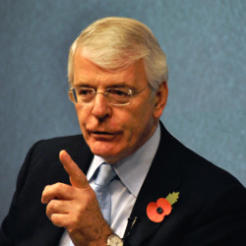Former Prime Minister John Major has called on the government to expand the remit and the funding of the Charity Commission, during the annual Hinton Lecture organised by NCVO.
The lecture has been given annually since 1998 in memory of Nicholas Hinton, a former director of NCVO, who also led Save the Children and Nacro.
Major used the 18th lecture, entitled A Nation at Ease with Itself, to say the Commission needed more resources to tackle malpractice in the charity sector, and should be given the job of encouraging more mergers among charities.
He said he did not believe that there were too many charities in the UK, or that people should be discouraged from setting up new ones. But he also said a charity should have to demonstrate a business case before it was registered.
“During my preparations for this evening, I have sought the views of many specialists on the work of civil society,” he said. “Some suggested that we have too many charities, and that it would be less wasteful, more efficient, and minimise duplication of effort, if they merged.
“There is a logic to that suggestion – but I have reservations about how desirable it is. The urge to set up a charity is surely driven by the heart, not the head, and I would be disinclined to discourage that.
“In any case, I fancy small charities dip into a different pool for funding – and it would be folly to lose their enthusiasm. In my experience, they also offer small, anonymous acts of kindness, vital to the recipient, that may be overlooked by their larger brethren.
“Others – with an eye to the reputation of charities – have argued there is a strong case for charities to make a sound business case before they are formally registered. This I do agree with.
“As a general principle, I am not an admirer of regulators. I am therefore surprised to have reached the conclusion that we would be wise to expand the remit, and the funding, of the Charity Commissioners. I believe, in so doing, we can improve the chance of eliminating malpractice and scandals in a charity sector that has an annual income of nearly £70bn.”
Proud of charitable work
Major used the lecture to speak about the importance of charity in combating poverty. But he warned of threats to charity and its funding.
“There are many things that make me proud of our country – but none more so than the scale of philanthropic, voluntary and charitable work that is the daily labour of many in every corner of the UK,” he said.
“But – a reality check: we cannot be complacent about our charitable sector. There are negatives: we have all seen the publicity generated by bad fundraising practices and poor governance. I won’t dwell on these shortcomings, except to note that all charities have a duty to protect their reputation. Unless they are seen as efficient and well run, donations will fall away. Giving is not a given.”
He said he was concerned about the future of National Lottery funding for the charity sector.
“I admit to paternal affection for the Lottery, but worry for its future,” he said. “It was designed as a National Lottery – in effect, a monopoly – to maximise returns for the designated good causes.
“But its success has attracted rivals. In recent years, so-called ‘umbrella’ society lotteries have emerged, that have circumvented the original legislation, and pay a far smaller proportion of their income back to worthy causes. ‘Betting on lottery’ operators have also expanded, blurring the line between lotteries and gambling.
“If these rivals grow or multiply in number, they will threaten the future of the National Lottery. Charities should all be concerned about this.”
'More and more' concerned about poverty
Major said he remained extremely concerned about the impact of poverty on people in the UK, and that he saw charity as an extremely powerful force to combat inequality and relative poverty.
He said there was a gap between the measures needed to combat social need and the things the taxpayer could afford.
“For a long time civil society has bridged much of that divide, helped by tax reliefs and state funding,” he said. “But inevitably there are still gaps.”
He said that in recent years he had reflected “more and more” about the impact of poverty. He said that during his own term as Prime Minister he had wanted to combat inequality, but that “overall, I failed”.
He said he remembered living in circumstances where “the week was longer than the money” and that living in such circumstances had never left him.
Major identified education and proper housing as key issues to lift people out of poverty, and also said that it was important to encourage growth in the economy, particularly in areas where there were few jobs.
And he warned against demonising those in poverty. He warned that unemployed individuals could not easily pick up and move to other areas to seek work.
“Everyone in receipt of benefits is not a scrounger,” he said. “Of course idlers and scroungers exist – and governments are entirely right to root out the cheats who rip off the taxpayer. But the focus must not be only on those who abuse the system; we need equal concentration on those who are failed by the system.”
He said that poverty was an economic problem for everybody, because those who could not contribute lowered productivity for others.
“We can raise living standards: we have been doing so for decades,” he said. “But there is no cause for complacency: a hard core of relative poverty still remains.”








